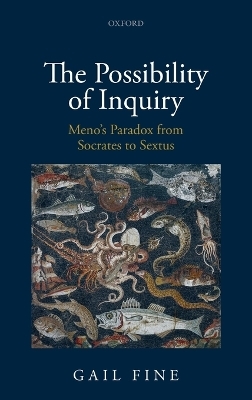
The Possibility of Inquiry
Oxford University Press (Verlag)
978-0-19-957739-2 (ISBN)
Gail Fine presents an original interpretation of a compelling puzzle in ancient philosophy. Meno's Paradox, which is first formulated in Plato's Meno, challenges the very possibility of inquiry. Plato replies with the theory of recollection, according to which we all had prenatal knowledge of some range of things, and what we call inquiry involves recollecting what we previously knew; he also illustrates this with his famous cross-examination of an untutored slave about a geometry problem, whose solution the slave is able to discover through inquiry. Hence, contrary to the paradox, inquiry is possible after all. Plato is not the only philosopher to grapple with Meno's Paradox: so too do Aristotle, the Epicureans, the Stoics, and Sextus. How do their various replies compare with one another, and with Plato's? How good are any of their replies? In a fascinating fragment preserved in Damascius' Commentary on the Phaedo, Plutarch briefly considers these questions (though for obvious chronological reasons he doesn't discuss Sextus). But Fine's book is the first full-length systematic treatment of the paradox and responses to it. Among the topics discussed are the nature of knowledge; how knowledge differs from mere true belief; the nature of inquiry; varieties of innatism; concepts and meaning; the scope and limits of experience. The Possibility of Inquiry will be of interest to anyone interested in ancient epistemology, in ancient philosophy, or in epistemology.
Gail Fine earned her BA from the University of Michigan, and her PhD from Harvard University. Since 1975, she has been a professor in the Sage School of Philosophy at Cornell University. Since 2008, she has also been a Senior Research Fellow in Merton College, Oxford, and a Visiting Professor of Ancient Philosophy in the University of Oxford. She is the author of On Ideas: Aristotle's Criticisms of Plato's Theory of Forms (Clarendon Press, 1993); of Plato on Knowledge and Forms: Selected Essays (Clarendon Press, 2003); and of many articles in various areas of ancient philosophy. She is also the editor of Plato 1 and 2 in the Oxford Readings in Philosophy series (OUP, 1999), and of the Oxford Handbook of Plato (OUP USA, 2008).
1. Introduction ; PART I: PLATO'S MENO ; 2. The Origins of the Problem ; 3. Meno's Questions and Socrates' Dilemma ; 4. Socrates' Three-Stage Reply: the First and Second Stages ; 5. The Third Stage: the Second Statement of The Theory of Recollection ; PART II: ARISTOTLE AND AFTER ; 6. Aristotelian Inquiry ; 7. Epicurean Inquiry ; 8. Stoic Inquiry ; 9. Plutarch's Account ; 10. Sceptical inquiry: Sextus and the Stoics ; 11. Sceptical Inquiry: Sextus and the Epicureans ; Bibliography ; Index Locorum ; Index Nominum ; General Index
| Erscheint lt. Verlag | 27.3.2014 |
|---|---|
| Verlagsort | Oxford |
| Sprache | englisch |
| Maße | 162 x 241 mm |
| Gewicht | 760 g |
| Themenwelt | Geisteswissenschaften ► Philosophie ► Erkenntnistheorie / Wissenschaftstheorie |
| Geisteswissenschaften ► Philosophie ► Philosophie Altertum / Antike | |
| ISBN-10 | 0-19-957739-0 / 0199577390 |
| ISBN-13 | 978-0-19-957739-2 / 9780199577392 |
| Zustand | Neuware |
| Haben Sie eine Frage zum Produkt? |
aus dem Bereich


